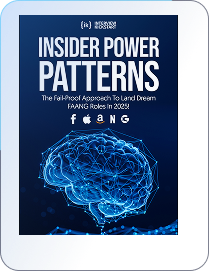Hadoop is an open-source big-data framework with YARN, HDFS, and MapReduce as the three components. Many companies and organizations use Hadoop globally, including Twitter, Netflix, Uber, and the NSA of the United States.
It helps to know what kind of Hadoop interview questions to expect in order to better understand what interviewers are looking for. This article focuses on Hadoop interview questions so you can gauge your preparation levels.
If you are preparing for a tech interview, check out our technical interview checklist, interview questions page, and salary negotiation ebook to get interview-ready! Also, read Amazon Coding Interview Questions, Facebook Coding Interview Questions, and Google Coding Interview Questions for specific insights and guidance on Coding interview preparation.
Having trained over 11,000 software engineers, we know what it takes to crack the toughest tech interviews. Our alums consistently land offers from FAANG+ companies. The highest ever offer received by an IK alum is a whopping $1.267 Million!
At IK, you get the unique opportunity to learn from expert instructors who are hiring managers and tech leads at Google, Facebook, Apple, and other top Silicon Valley tech companies.
Want to nail your next tech interview? Sign up for our FREE Webinar.
In this article, we’ll cover:

We’ll begin with some sample Hadoop interview questions and answers to get a basic idea of what to expect:
HDFS stands for Hadoop Distributed File System. It serves as the storage unit of Hadoop and follows master and slave topology. It helps us take different types of data as blocks and store them in a distributed environment.
The three modes are:
Resource manager, Node manager, container, and application master are some important YARN components.
YARN stands for Yet Another Resource Negotiator and serves as the processing framework in Hadoop. It helps by managing resources and providing an execution environment for the processes.
A trick question. MapReduce prohibits reducers from communicating with each other. So reducers can’t communicate with each other and run in isolation.
Now, here are some sample Hadoop interview questions. See if you can solve them:
Let’s move a step further with some Hadoop interview questions for experienced professionals:
Lastly, here are some Hadoop data engineer interview questions. Ensure you can solve them before your interview:
Q1. What are the three main components of Hadoop?
The three components of Hadoop are Hadoop HDFS (storage unit), Hadoop MapReduce (processing unit), and Hadoop YARN (resource management unit).
Q2. Name the three modes in which Hadoop can run.
The three modes Hadoop can run in are Standalone mode, Pseudo-distributed mode, and Fully-distributed mode.
Q3. What is Hadoop used for?
Apache Hadoop is used for the efficient storage and processing of large datasets. The datasets are massive; their size ranges from gigabytes to petabytes. Hadoop enables the clustering of multiple computers to analyze massive datasets faster in parallel instead of using one large computer for storage and processing.
Q4. Name the different Hadoop configuration files.
Hadoop configuration files include hadoop-env.sh, mapred-site.xml, core-site.xml, Master, Slaves, yarn-site.xml, and hdfs-site.xml.
Q5. What are some key characteristics of Hadoop?
Hadoop is open-source, cost-effective, and faster in data processing. Based on the data locality concept, it provides fault tolerance, high availability, and feasibility. Hadoop cluster is also highly scalable.
Whether you’re a coding engineer gunning for a software developer or software engineer role, a tech lead, or you’re targeting management positions at top companies, IK offers courses specifically designed for your needs to help you with your technical interview preparation!
If you’re looking for guidance and help with getting started, sign up for our FREE webinar. As pioneers in technical interview preparation, we have trained thousands of software engineers to crack the most challenging coding interviews and land jobs at their dream companies, such as Google, Facebook, Apple, Netflix, Amazon, and more!
â€
Attend our free webinar to amp up your career and get the salary you deserve.

693+ FAANG insiders created a system so you don’t have to guess anymore!

100% Free — No credit card needed.

Time Zone:






Get your enrollment process started by registering for a Pre-enrollment Webinar with one of our Founders.

The 11 Neural “Power Patterns” For Solving Any FAANG Interview Problem 12.5X Faster Than 99.8% OF Applicants
The 2 “Magic Questions” That Reveal Whether You’re Good Enough To Receive A Lucrative Big Tech Offer
The “Instant Income Multiplier” That 2-3X’s Your Current Tech Salary

The 11 Neural “Power Patterns” For Solving Any FAANG Interview Problem 12.5X Faster Than 99.8% OF Applicants
The 2 “Magic Questions” That Reveal Whether You’re Good Enough To Receive A Lucrative Big Tech Offer
The “Instant Income Multiplier” That 2-3X’s Your Current Tech Salary
Just drop your name and email so we can send your Power Patterns PDF straight to your inbox. No Spam!
By sharing your contact details, you agree to our privacy policy.
Time Zone: Asia/Dhaka

We’ve sent the Power Patterns PDF to your inbox — it should arrive in the next 30 seconds.
📩 Can’t find it? Check your promotions or spam folder — and mark us as safe so you don’t miss future insights.
We’re hosting a private session where FAANG insiders walk through how they actually use these Power Patterns to crack interviews — and what sets top performers apart.
🎯 If you liked the PDF, you’ll love what we’re sharing next.
Time Zone:

